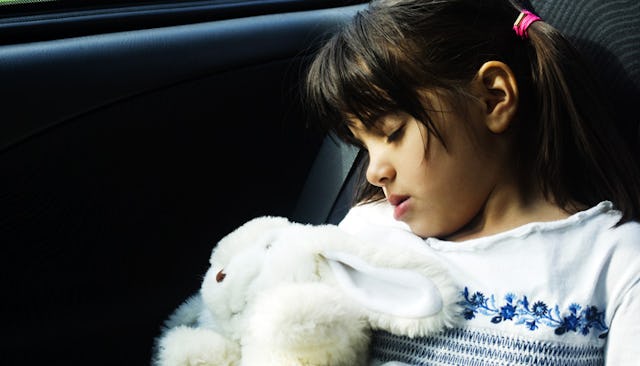Leaving Kids In The Car For Five Minutes Isn't Child Abuse

I recently left my two boys in the car while I ran into a small-town bakery. I did it because my younger son was sleeping, and I didn’t want to wake him and walk him and my 5-year-old across the street while I bought a loaf of bread, a one-minute transaction. I left the windows open, ran across the street, bought my bread, and left. My heart was pounding the whole time, not because I was afraid they would be abducted—they were about 20 feet from me, and in my sight the whole time. And not because of fear of overheating: It was a cool day and they were parked under the shade of a big tree.
No, the only risk I was actually running was being arrested for child abuse or neglect. And that risk was so nerve-wracking that I resolved never to do it again, even if it meant dragging a sleeping toddler out of his car seat for a thirty-second errand.
But now New Jersey’s Supreme Court has issued a ruling, a ruling that columnist and free-range parenting advocate Lenore Skenazy calls “a light unto us all,” that leaving a child in a car on a mild day for few minutes while you run an errand is not necessarily abuse or neglect.
In the New Jersey case, a mom identified as E.D.-O left her toddler daughter in the car on a 55-degree day while she ran into a Dollar Store. By the time she returned a few minutes later, security guards had called the police, launching a 6-year legal battle. The unanimous decision means she will get a hearing to plead her case, which had been previously denied. It also means that the state will not be able to automatically enroll E.D.-O, and other parents facing similar charges, on the state’s Child Abuse and Neglect Registry, a list that will obviously permanently limit your career options if you find yourself on it.
This is good news. Too many parents, including Kim Brooks, who was arrested for leaving her son in a cool car for five minutes while she ran into a store, have been caught up in a legal mania to punish parents for every perceived bad parenting decision—even when the risk of harm to the child is almost nil.
(To be clear, no one is talking about parents who lock their kids in cars for hours a time, or on very hot days. Those kind of cases are horrifying—either genuine neglect or, as the Salon article points out, terrible lapses, like a change in the day care routine means the parent forgets the kid is in the back seat at all. Those are clearly, obviously, tragedies—and not at all what I’m talking about. Skenazy writes: “Of the 30–40 kids who die in hot cars every year, 80 percent were forgotten there for hours, or climbed in when no one was looking and couldn’t get out. They were not waiting in the car while mom ran into the store to pick up the pizza.”)
The New Jersey Supreme Court agreed with the mother’s lawyer that there was no way parents could guarantee a risk-free childhood for their kids, and that we shouldn’t expect them to. Parents take risks when they take their kids swimming, buckle them into the car, or board a plane, and the recent overreach by the police and courts is creating an unreasonable environment of fear for parents. As University of Idaho law professor David Pimentel wrote me in an email, “No one is the ultimate authority on what risks are okay to take, and which risks are unacceptable (we don’t prosecute parents for driving kids around in cars, even though it is far more dangerous to have a child in a moving car than in a stationary one).”
The fact that conscientious parents, who find the risk of injury to a kid left in a cool car for five minutes to be nearly nothing, are caught up in these legal nightmares is unconscionable. It casts a pall over all of us, the fear that the police will override our decisions, as parents, about what’s safe for our kids. As Pimentel writes, “it is easy to second-guess someone else’s parenting. It has become common to criticize, and righteously condemn, the parenting choices that other parents make. But it is really scary when the force of the state, through 911 calls, police, and Child Protective Services interventions, are invoked to terrorize the parents being criticized.”
I’m glad the mother won her 6-year legal battle, and that Kim Brooks managed to get off with 100 hours of community service and a parenting education class. But they never should have had to go through that in the first place. I spent most of my 1970’s childhood waiting for my mother in the car, and no one considered it out of the ordinary. (I also was allowed to roam freely in our safe small town, but do that nowadays and you might find yourself arrested.) What we consider good parenting nowadays—constant supervision and vigilance—is limiting us, and our kids. We should be able to buy a loaf of bread without being terrified someone’s going to call the cops.
This article was originally published on